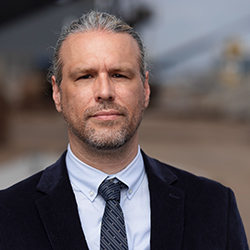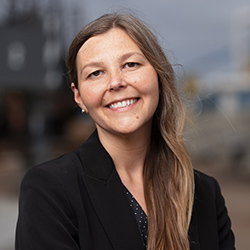
Meet the Editors
The JMLC continues to be a professionally published journal with two Co-Editors-in-Chief: Justin Kishbaugh and Julia Wyman. The JMLC has a rotating staff of other editors and peer-reviewers in the field of maritime law.
Additionally, the JMLC has a cohort of student editors at the Roger Williams University School of Law who assist the Editors-in-Chief.
Justin Kishbaugh
 Dr. Justin Kishbaugh is the Director of the Writing Center, the Associate Director of Academic Success, and a Professor of Writing at Roger Williams University School of Law. He has extensive editorial experience, having co-edited two poetry anthologies for Clemson University Press and serving as a Deputy Editor for the American Bar Associationʼs 2016 International Law Year in Review, the North American Associate Editor of the New Canterbury Literary Society News, Managing Editor of the Ezra Pound Society Newsletter, and Head Editor of the literary journal, :lexicon. In 2010, he received the Duquesne University Publications Board Award for Excellence in Editorial Work.
Dr. Justin Kishbaugh is the Director of the Writing Center, the Associate Director of Academic Success, and a Professor of Writing at Roger Williams University School of Law. He has extensive editorial experience, having co-edited two poetry anthologies for Clemson University Press and serving as a Deputy Editor for the American Bar Associationʼs 2016 International Law Year in Review, the North American Associate Editor of the New Canterbury Literary Society News, Managing Editor of the Ezra Pound Society Newsletter, and Head Editor of the literary journal, :lexicon. In 2010, he received the Duquesne University Publications Board Award for Excellence in Editorial Work.
Dr. Kishbaugh holds an M.F.A in Creative Writing from the Jack Kerouac School of Disembodied Poetics at Naropa University and a Ph.D. in English Literature from Duquesne University. He has taught academic and creative writing at the university level since 2004 and legal writing since 2010. He has been invited to present papers, read poetry, and chair panels at a series of international conferences, and his scholarship primarily focuses on structuralist writing pedagogies, metaphor and analogy in legal writing, and the poetry of Ezra Pound.
Julia Wyman
 Julia Wyman is the Director of the Marine Affairs Institute and the Director of the Rhode Island Sea Grant Legal Program. Ms. Wyman has extensive state and national ocean and coastal law and policy experience. Prior to her current position, Ms. Wyman served as Ocean and Environmental Counsel for Sen. Sheldon Whitehouse (D-RI), the staff attorney at the Marine Affairs Institute, and the policy analyst for the Coastal States Organization in Washington, D.C., an organization that represents the interests of the governors of the thirty-five coastal states, commonwealths, and territories.
Julia Wyman is the Director of the Marine Affairs Institute and the Director of the Rhode Island Sea Grant Legal Program. Ms. Wyman has extensive state and national ocean and coastal law and policy experience. Prior to her current position, Ms. Wyman served as Ocean and Environmental Counsel for Sen. Sheldon Whitehouse (D-RI), the staff attorney at the Marine Affairs Institute, and the policy analyst for the Coastal States Organization in Washington, D.C., an organization that represents the interests of the governors of the thirty-five coastal states, commonwealths, and territories.
Much of Ms. Wymanʼs work has focused on coastal adaptation to climate change. She serves as an adjunct faculty member at RWU School of Law, where she teaches courses related to ocean and coastal law and policy, including Climate Change Law and Policy, Ocean Management Law and Policy, and Environmental Justice.
Ms. Wyman received her J.D. from the University of Maine School of Law and her B.A. from Trinity College. She is also an alumna of the Williams-Mystic maritime studies program.
